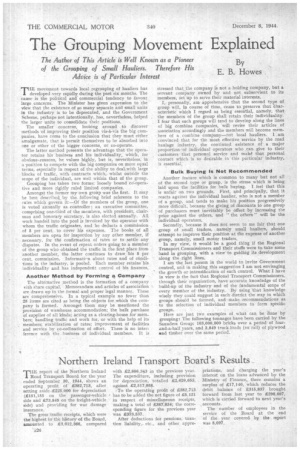The Grouping Movement Explained
Page 28

If you've noticed an error in this article please click here to report it so we can fix it.
The Author of This Article is Well Known as a Pioneer of the Grouping of Small Hauliers. Therefore His Advice is of Particular Interest
By E. B. Howes
THE movement towards local regrouping of hauliers has .1 developed very rapidly during the past six months, The cause is the political and commercial tendency to favour large concerns. The Minister has given expression to the view that the existence of so many separate and small units in the industry is -to be deprecated, and the Government Scheme, perhaps not intentionally, has, nevertheless, helped the larger units to consolidate their positions.
The smaller concerns, looking around to discover methods of improving their position vis-a-vis the big companies, have come to the conclusion that they must either amalgamate, that is permit themselves to be absorbed into one or other of the bigger concerns, or co-operate.
The latter method presents the advantage that the operator retains his business and his individuality, which, for obvious.reasons, he values highly, but is, nevertheless, in a position to compete with the big companies on more equal terms, especially in respect of the ability to deal with large blocks of traffic, with contracts which, whilst outside the scope of the individual, are well within that of the group.
Grouping has taken two forms: loosely bound co--operative and more rigidly ruled limited companies. Amongst the former my own group was the first. It may be best described, by the, following brief reference to the rules which govern it:—Of the members of the group, one is voted annually as controller; an executive committee, comprising one-third of the members, with president, chairman and honorary secretary, is also elected annually. All work handed into the pool is invoiced by the operator with whom the traffic originates, and he deducts a commission of 5 per cent, to cover his expenses. The books of all members are open for inspection by any other member, if necessary, for the confirmation of rates or to settle any disputes. In the event of repeat orders going to a member of the group who obtained the traffic in the first place from another member, the latter continues to draw, his 5 per cent. commission. Informatien about rates and of ebnditions in the industry, is pooled. Each member retains his individuality and has independent control of his finances.
Another Method by Forming a Company
The alternative method is the formation of a company vith share capital. Memorandum and articles of association are drawn up in the formal and proper legal manner. These are comprehensive. In a typical example no fewer than 25 items are cited as being the objects for which the company is formed. Amongst them may be mentioned the provision of warehouse accommodation; the bulk purchase of supplies of all kinds; acting as a clearing-house for members; handling traffic and work for, or with the help of its members; stabilization of rates; improvement of facilities and service by co-ordination of effort. There is no interference with the business of individual members. It is
stressed that the company is not a holding company, but a servant company owned by and not subservient to its members, set up to serve their material interests.
I, personally, am apprehensive that the second type of group will, in course of time, cease to preserve that Characteristic which I regard as being essential, namely, that the members of the group shall retain their individuality. I fear that such groups will tend to develop along the lines of big combine companies, will revise their articles of association accordingly and the members will become members of a combine company—not local hauliers. I am convinced that for the most effective service by the road haulage industry, the continued existence of a major propoition of individual operators who can give to their customers that personal service and make that personal contact which is so desirable in this particular industry, is essenlial,.
Bulk Buying Is Not Recommended Another feature which is common to many but not all of the second type or group, is the stress which is being laid upon the facilities for bulk buying. I feel that this is unfair on two grounds. First, and principally, that it reacts against the individual haulier, who is not a member of a group, and tends to make his position progressively more difficult, because the giving of discounts to one group of purchasers must inevitably be offset by increasing the price against the others, and "the others" will be the individual operators.
Secondly, because it does not seem to me lair that one group of small traders, namely small hauliers, should attempt to improve their position at the expense of another group, namely, small motor traders.
In my view, it would be a good thing if the Regional Transport Commissioners and their staffs were to take some hand in grouping, with a view to guiding its development along the right lines.
I am the last person in the world to invite Government control, and in making this suggestion I am not envisaging the growth or intensification of such control. What I have in view is the fact that Regional Transport Commissioners, through their organization, have accurate knowledge of the build-up of the industry and of the fundamental scope of every member of the. industry. By using that knowledge wisely they could suggest in each district the way in which groups should he formed, and make recommendations as to the selection of individual members to form specific groups.
Here are just two examples of what can be done by grouping: The following tonnages have been carried by the Saunders Group: 103,000,000 bricks over a period of f ourand-a-half years, and 3,849 truck loads (ex rail) of plywood and timber over the same period.




















































